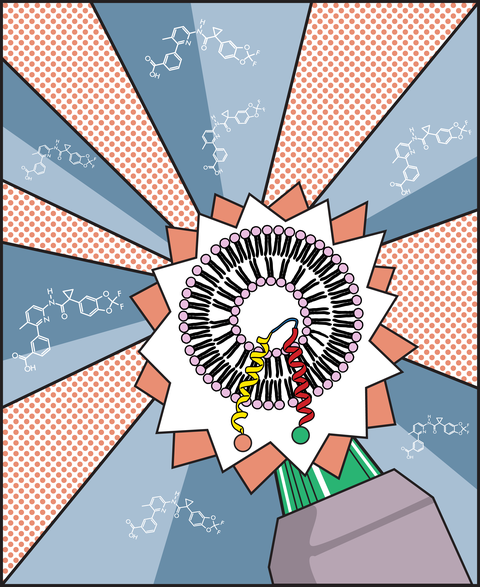Jul 15, 2020
B CUBE investigates possibilities of cystic fibrosis therapy

Graphic illustration of a fluorescently labeled CFTR protein hairpin reconstituted in a vesicle, surrounded by the drug Lumacaftor in solution. The protein hairpin diffuses through the beam of a green laser, undergoes FRET and emits red fluorescence
Cystic fibrosis is a genetic disorder that causes viscous mucus in the lungs and other organs, leading to breathing problems and digestive disorders. Cystic fibrosis is not curable. However, therapies can slow down the course of the disease. In Germany, up to 8,000 persons are affected by the incurable hereditary disease cystic fibrosis.
The Mukoviszidose e.V. connects patients, relatives, doctors, therapists and researchers. As a non-profit association, it supports selected research projects that are intended to improve the treatment of cystic fibrosis. Yesterday the association announced that it supports a project of B CUBE - Center for Molecular Bioengineering at TU Dresden over the next three years.
Screening platform to facilitate search for suitable CFTR modulators
The project is carried out by Prof. Michael Schlierf's research group in collaboration with Dr. Georg Krainer (University of Cambridge, Centre for Misfolding Diseases) and focuses on rare mutations in the CFTR protein derived from cystic fibrosis patients. The aim of the project is to establish an automated screening platform that will enable the search for modulators for the therapy of rare mutations. For this purpose, a library of CFTR protein substructures will be created, which carry the different mutations. Prof. Michael Schlierf: "We want to develop a method to screen in large scale for drugs that will correct the misfolding of the transmembrane protein CFTR”.
The B CUBE scientists have already developed a test procedure based on a specialized single-molecule microscopy technique. This will now be automated within the project in order to be able to carry out a large number of tests in a short time. This method can help to better understand mutations with regard to their effect on the protein structure and to use the knowledge for targeted drug development.
